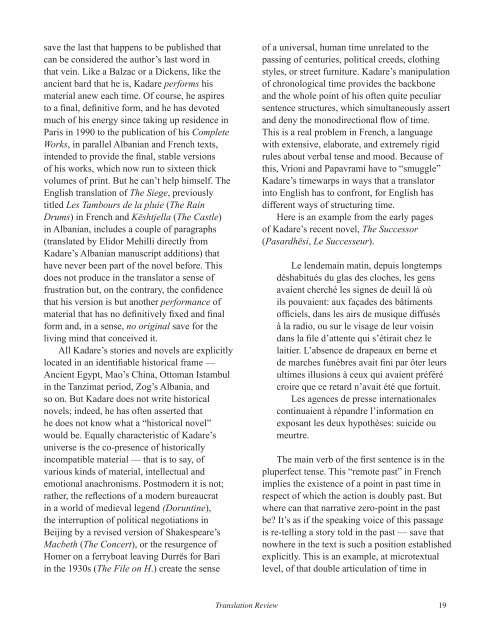Table of contents - The University of Texas at Dallas
Table of contents - The University of Texas at Dallas
Table of contents - The University of Texas at Dallas
You also want an ePaper? Increase the reach of your titles
YUMPU automatically turns print PDFs into web optimized ePapers that Google loves.
save the last th<strong>at</strong> happens to be published th<strong>at</strong><br />
can be considered the author’s last word in<br />
th<strong>at</strong> vein. Like a Balzac or a Dickens, like the<br />
ancient bard th<strong>at</strong> he is, Kadare performs his<br />
m<strong>at</strong>erial anew each time. Of course, he aspires<br />
to a final, definitive form, and he has devoted<br />
much <strong>of</strong> his energy since taking up residence in<br />
Paris in 1990 to the public<strong>at</strong>ion <strong>of</strong> his Complete<br />
Works, in parallel Albanian and French texts,<br />
intended to provide the final, stable versions<br />
<strong>of</strong> his works, which now run to sixteen thick<br />
volumes <strong>of</strong> print. But he can’t help himself. <strong>The</strong><br />
English transl<strong>at</strong>ion <strong>of</strong> <strong>The</strong> Siege, previously<br />
titled Les Tambours de la pluie (<strong>The</strong> Rain<br />
Drums) in French and Kështjella (<strong>The</strong> Castle)<br />
in Albanian, includes a couple <strong>of</strong> paragraphs<br />
(transl<strong>at</strong>ed by Elidor Mehilli directly from<br />
Kadare’s Albanian manuscript additions) th<strong>at</strong><br />
have never been part <strong>of</strong> the novel before. This<br />
does not produce in the transl<strong>at</strong>or a sense <strong>of</strong><br />
frustr<strong>at</strong>ion but, on the contrary, the confidence<br />
th<strong>at</strong> his version is but another performance <strong>of</strong><br />
m<strong>at</strong>erial th<strong>at</strong> has no definitively fixed and final<br />
form and, in a sense, no original save for the<br />
living mind th<strong>at</strong> conceived it.<br />
All Kadare’s stories and novels are explicitly<br />
loc<strong>at</strong>ed in an identifiable historical frame —<br />
Ancient Egypt, Mao’s China, Ottoman Istambul<br />
in the Tanzim<strong>at</strong> period, Zog’s Albania, and<br />
so on. But Kadare does not write historical<br />
novels; indeed, he has <strong>of</strong>ten asserted th<strong>at</strong><br />
he does not know wh<strong>at</strong> a “historical novel”<br />
would be. Equally characteristic <strong>of</strong> Kadare’s<br />
universe is the co-presence <strong>of</strong> historically<br />
incomp<strong>at</strong>ible m<strong>at</strong>erial — th<strong>at</strong> is to say, <strong>of</strong><br />
various kinds <strong>of</strong> m<strong>at</strong>erial, intellectual and<br />
emotional anachronisms. Postmodern it is not;<br />
r<strong>at</strong>her, the reflections <strong>of</strong> a modern bureaucr<strong>at</strong><br />
in a world <strong>of</strong> medieval legend (Doruntine),<br />
the interruption <strong>of</strong> political negoti<strong>at</strong>ions in<br />
Beijing by a revised version <strong>of</strong> Shakespeare’s<br />
Macbeth (<strong>The</strong> Concert), or the resurgence <strong>of</strong><br />
Homer on a ferrybo<strong>at</strong> leaving Durrës for Bari<br />
in the 1930s (<strong>The</strong> File on H.) cre<strong>at</strong>e the sense<br />
<strong>of</strong> a universal, human time unrel<strong>at</strong>ed to the<br />
passing <strong>of</strong> centuries, political creeds, clothing<br />
styles, or street furniture. Kadare’s manipul<strong>at</strong>ion<br />
<strong>of</strong> chronological time provides the backbone<br />
and the whole point <strong>of</strong> his <strong>of</strong>ten quite peculiar<br />
sentence structures, which simultaneously assert<br />
and deny the monodirectional flow <strong>of</strong> time.<br />
This is a real problem in French, a language<br />
with extensive, elabor<strong>at</strong>e, and extremely rigid<br />
rules about verbal tense and mood. Because <strong>of</strong><br />
this, Vrioni and Papavrami have to “smuggle”<br />
Kadare’s timewarps in ways th<strong>at</strong> a transl<strong>at</strong>or<br />
into English has to confront, for English has<br />
different ways <strong>of</strong> structuring time.<br />
Here is an example from the early pages<br />
<strong>of</strong> Kadare’s recent novel, <strong>The</strong> Successor<br />
(Pasardhësi, Le Successeur).<br />
Le lendemain m<strong>at</strong>in, depuis longtemps<br />
déshabitués du glas des cloches, les gens<br />
avaient cherché les signes de deuil là où<br />
ils pouvaient: aux façades des bâtiments<br />
<strong>of</strong>ficiels, dans les airs de musique diffusés<br />
à la radio, ou sur le visage de leur voisin<br />
dans la file d’<strong>at</strong>tente qui s’étirait chez le<br />
laitier. L’absence de drapeaux en berne et<br />
de marches funèbres avait fini par ôter leurs<br />
ultimes illusions à ceux qui avaient préféré<br />
croire que ce retard n’avait été que fortuit.<br />
Les agences de presse intern<strong>at</strong>ionales<br />
continuaient à répandre l’inform<strong>at</strong>ion en<br />
exposant les deux hypothèses: suicide ou<br />
meurtre.<br />
<strong>The</strong> main verb <strong>of</strong> the first sentence is in the<br />
pluperfect tense. This “remote past” in French<br />
implies the existence <strong>of</strong> a point in past time in<br />
respect <strong>of</strong> which the action is doubly past. But<br />
where can th<strong>at</strong> narr<strong>at</strong>ive zero-point in the past<br />
be It’s as if the speaking voice <strong>of</strong> this passage<br />
is re-telling a story told in the past — save th<strong>at</strong><br />
nowhere in the text is such a position established<br />
explicitly. This is an example, <strong>at</strong> microtextual<br />
level, <strong>of</strong> th<strong>at</strong> double articul<strong>at</strong>ion <strong>of</strong> time in<br />
Transl<strong>at</strong>ion Review 19

















